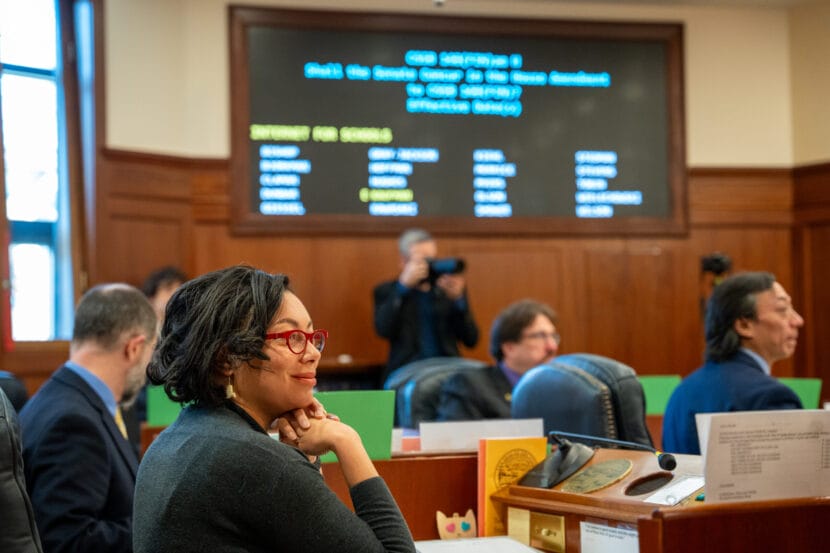Alaska faces a child care crisis, with many urban parents facing high costs and limited availability and rural parents facing child care deserts. Gov. Mike Dunleavy established a task force last year to address the rising issue.
At the same time, public education funding has been stagnant for years, and rising inflation is leaving school districts with tough choices on how to do more with less.
Now, the state Legislature is relaunching an Alaska Children’s Caucus in hopes of tackling some of those problems. The last time the Legislature had a children’s caucus was in 2019, but it was short-lived. Before that, there hadn’t been one in 17 years.
The new caucus is focused on providing support to children from birth to adulthood.
Sen. Löki Tobin, D-Anchorage, co-chairs the caucus and said working-age families are experiencing “a really rocky infrastructure.”
“The pandemic really disrupted many systems of support for our working-age families, for our working parents,” Tobin said. “We need to have a better structure and system of how we as Alaska, provide those structures of support.”
The new caucus held its first meeting Monday night, where the members heard a presentation from the Hunt Institute, a national organization that helps legislators across the country develop plans for addressing the needs of children.
Dan Wuori is a senior early childhood advisor with the Hunt Institute. He said Alaska is one of 14 states with a dedicated child caucus, and early steps for those organizations include determining who will be a part of it and what sorts of infrastructure they’ll need to keep them afloat. He said another thing the groups have to consider is their purpose and goals.
“What will the role of the caucus be in considering legislation, and/or will it be more sort of an educational venue for members?” Wuori said. “Will you hold public hearings?”
Wuori used the Keiki Caucus in Hawaii as an example of a children’s caucus that works well. He said the group has been organized for 30 years, and regularly holds bill hearings and discussions over pre-filed legislation before each of the state’s legislative sessions.
“They identify typically a package of five or six bills that they agree to as a caucus, to be their kind of priority agenda for the year, and use that as an opportunity to help to advance that legislation,” Wuori said.
Alternatively, he said many other state children caucuses serve primarily to educate other legislators about certain topics related to children.
Tobin said she hopes the newly re-formed Alaska Children’s Caucus will be a mix of approaches. It’s a bipartisan group. The other co-chairs are Sen. Cathy Giessel, R-Anchorage, Rep. Mike Cronk, R-Tok, and Rep. Maxine Dibert, D-Fairbanks.
“We’re not trying to limit ourselves, but think about what we might need to bring to the table so that we can get to good high-quality interventions and policy that really continue launching our young kiddos into their next, the next iterative of where they need to be,” Tobin said.
Tobin serves on the governor’s child care task force and is currently getting her doctorate in culturally responsive education. She said the caucus will aim to help unite the priorities of the multiple state systems in place that serve the needs of children, but are in different departments
“We recognize that those systems were all siloed,” Tobin said. “They didn’t really talk with one another. They didn’t interact with one another. And there wasn’t a holistic, overarching structure or plan to ensure that those systems fed well into one another.”
As the caucus works through how it will operate, Tobin said there are a number of legislative items currently being discussed. They include a proposal from the governor to expand Medicaid access to public schools, which Tobin hopes will bolster behavioral health services. There’s also a legislative bill that would expand access to child care for families.
“So I think there’s a lot of things happening and a lot of excitement from many of our caucus members,” Tobin said. “And I’m looking forward to continuing to work on that legislation, as well as look toward the 34th Legislature and what things we can continue to work on and do for our working age families.”
The next meeting of the Alaska Children’s Caucus will be on April 11, where they aim to hear recommendations from stakeholders in various industries involving children.


